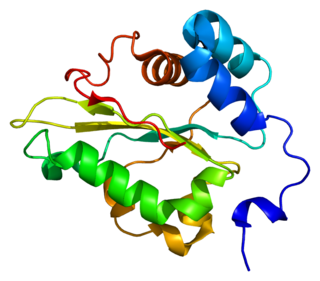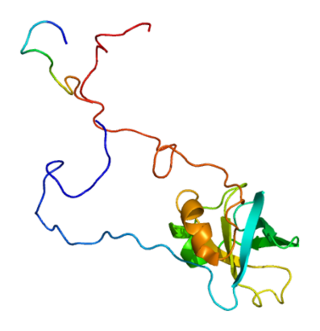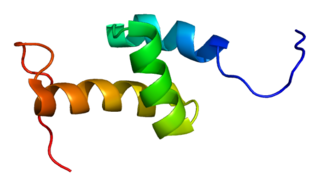
EF-Tu is a prokaryotic elongation factor responsible for catalyzing the binding of an aminoacyl-tRNA (aa-tRNA) to the ribosome. It is a G-protein, and facilitates the selection and binding of an aa-tRNA to the A-site of the ribosome. As a reflection of its crucial role in translation, EF-Tu is one of the most abundant and highly conserved proteins in prokaryotes. It is found in eukaryotic mitochondria as TUFM.
eEF-1 are two eukaryotic elongation factors. It forms two complexes, the EF-Tu homolog EF-1A and the EF-Ts homolog EF-1B, the former's guanide exchange factor. Both are also found in archaea.

Eukaryotic translation initiation factor 5A-1 is a protein that in humans is encoded by the EIF5A gene.

Elongation factor 1-delta is a protein that in humans is encoded by the EEF1D gene.

Elongation factor 1-alpha 1 (eEF1a1) is a translation elongation protein, expressed across eukaryotes. In humans, it is encoded by the EEF1A1 gene.

Elongation factor 1-beta is a protein that in humans is encoded by the EEF1B2 gene.

Eukaryotic elongation factor 2 is a protein that in humans is encoded by the EEF2 gene. It is the archaeal and eukaryotic counterpart of bacterial EF-G.

Elongation factor 1-gamma is a protein that in humans is encoded by the EEF1G gene.

Eukaryotic translation initiation factor 2 subunit 2 (eIF2β) is a protein that in humans is encoded by the EIF2S2 gene.

Elongation factor 1-alpha 2 is a protein that in humans is encoded by the EEF1A2 gene.

Eukaryotic elongation factor-2 kinase, also known as calmodulin-dependent protein kinase III (CAMKIII) and calcium/calmodulin-dependent eukaryotic elongation factor 2 kinase, is an enzyme that in humans is encoded by the EEF2K gene.

Elongation factor Tu, mitochondrial is a protein that in humans is encoded by the TUFM gene. It is an EF-Tu homolog.

Eukaryotic translation initiation factor 2A (eIF2A) is a protein that in humans is encoded by the EIF2A gene. The eIF2A protein is not to be confused with eIF2α, a subunit of the heterotrimeric eIF2 complex. Instead, eIF2A functions by a separate mechanism in eukaryotic translation.

Eukaryotic translation initiation factor 1A, X-chromosomal (eIF1A) is a protein that in humans is encoded by the EIF1AX gene. This gene encodes an essential eukaryotic translation initiation factor. The protein is a component of the 43S pre-initiation complex (PIC), which mediates the recruitment of the small 40S ribosomal subunit to the 5' cap of messenger RNAs.

Diphthamide biosynthesis protein 1 is a protein that in humans is encoded by the DPH1 gene. It encodes a protein that performs posttranslational modification of histidine-715 on eukaryotic translation elongation factor 2 to diphthamide. This modification appears to be important in the translation of Cyclin D in ovarian cells. DPH1 is mutated in 90% of ovarian cancers end stage, usually by loss of heterozygosity.

Eukaryotic translation elongation factor 1 epsilon-1 is a protein that in humans is encoded by the EEF1E1 gene.

Elongation factor Ts, mitochondrial is a protein that in humans is encoded by the TSFM gene. It is an EF-Ts homolog.
Eukaryotic translation elongation factor 1 alpha 1 pseudogene 43 (eEF1A3) is a protein that in humans is encoded by the EEF1A1P43 gene.
Eukaryotic translation elongation factor 1 beta 2 pseudogene 1 (eEF1B1) is a protein that in humans is encoded by the EEF1B2P1 gene.

Eukaryotic translation elongation factor 1 beta 2 pseudogene 2 (eEF1B3) is a protein that in humans is encoded by the EEF1B2P2 gene.
















